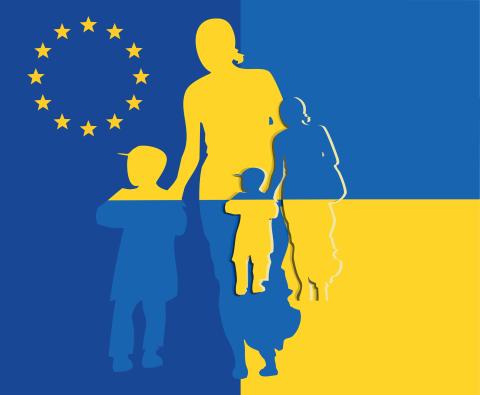European Economic
and Social Committee
Support for Ukrainian refugees should not be seen as a sprint run but rather as a marathon
After nine months of war in Ukraine, the EU institutions and the Member States are still striving to overcome the challenges of the migration crisis caused by Ukrainians fleeing the war on a massive scale. Civil society organisations (CSOs), NGOs and national stakeholders are also seeking practices to ensure the protection and integration of Ukrainian refugees, paying special attention to children and people with disabilities, with winter and war fatigue making these efforts harder.
The EESC's Section for Employment, Social Affairs and Citizenship (SOC) held a public hearing to discuss the state of play regarding the hosting of Ukrainian refugees in the EU, nine months after the war began. The event brought together representatives from international and European institutions, think tanks and civil society organisations in order to hear different perspectives.
Russia's war in Ukraine has reverberated from Finland to Greece, with countries bordering Ukraine hosting the majority of refugees. More than 76% of local and regional authorities have been at the frontline welcoming and hosting the first wave of refugees
, said Giuseppe Varacalli, member of the Committee of the Regions (CoR).
Lessons were learned from the 2015 migration crisis and we are now better prepared for humanitarian and refugee crisis management
, said Cecilia Verkleij, from the European Commission's Directorate-General for Migration and Home Affairs.
The EU Member States agreed to follow the Council's decisions in record time, showing solidarity with the Ukrainian people. The most important thing, especially for the Council, was getting across the message that the EU is united and standing in solidarity with Ukraine
, pointed out Lucie Verachten from the Council's General Secretariat, adding: The Council is committed to protecting the refugees
.
The Temporary Protection Directive (TPD) was activated at the very beginning and adopted by all EU Member States. Additionally, the Solidarity Platform, which brings together EU countries and relevant stakeholders ensuring the implementation of the TPD, and the EU Migration Preparedness and Crisis Management Mechanism Network were created to respond to the crisis and are coordinated by the European Commission.
Vulnerable groups require more support and attention
Vulnerable groups, including people with disabilities and unaccompanied minors, are in danger and are at risk of being trafficked. The event's participants highlighted the importance of securing adequate and tailor-made measures for these groups of refugees. Some examples were shared from the countries bordering Ukraine, specifically Romania and Poland.
Romania welcomed more than 2,847,088 Ukrainian refugees but only 90,106 of them remained in the country, 45% of whom are children.
Gabriela Alexandrescu, Executive President of the organisation Save the Children in Romania, stressed the importance of children's physical and emotional well-being. The organisation is working exclusively for Ukrainian children in five accommodation and procedure centres for asylum seekers at four border-crossing points.
However, winter makes it very difficult for NGOs and organisations to deal with the children's needs in terms of education, social integration, accommodation and psychological support
, added Ms Alexandrescu.
Zooming in on the situation in Poland, more than 600,000 minors entered the country, many of them crossing the border unaccompanied, making Poland the home of many Ukrainian orphans
, said Justyna Segeš Frelak from the International Centre for Migration Policy Development (ICMPD).
Even though some flexible and special measures were put in place, such as temporary guardianship, the lack of a reception system specially designed for these groups makes monitoring a difficult task. The absence of systematic and comprehensive identification procedures makes it hard to provide assistance, especially for people with disabilities whose disability certificates are not recognised as such in Poland.
The integration process is ongoing but there is still a lot to be done
The Member States and CSOs initially responded very quickly to the Ukrainian crisis, helping Ukrainian refugees to integrate.
Data from Eurofound's EU Policy Watch show that the Member States and Norway have adopted a total of 185 measures to support refugees, most of them drawn directly from the TPD.
However, Maria Cantero from Eurofound said: The pace has slowed down a bit since summer
.
In terms of employment, access to information and support from CSOs, volunteers and networks have helped Ukrainians find jobs. However, speakers at the event raised a number of issues that need to be taken into consideration, such as the language barrier, wasted talent when it comes to highly skilled professionals whose qualifications take a long time to be recognised, and the risk of exploitation and discrimination.
Magdalena Chojnowska from the All-Poland Alliance of Trade Unions flagged the fact that 70% of refugees are employed under precarious contracts, stressing that illegal employment remains high, with workers not always being paid.
Sogol Noorani from the Eurydice network (EACEA) provided an overview of a report on the educational integration of Ukrainian children, underlining that data had been collected in May 2022. Education systems responded rapidly with practices to help schools, welcoming Ukrainian students.
In conclusion, the speakers emphasised all the actions, measures and practices that have been implemented to help Ukrainian refugees, demonstrating that solidarity and cooperation among Member States should be the continent's blueprint for the future.
The event report is available on the event page.
Work organisation
Downloads
-
Support for Ukrainian refugees should not be seen as a sprint run but rather as a marathon
